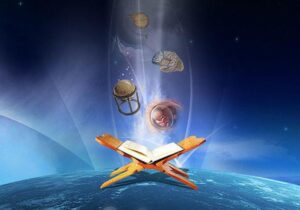
Faith and Science:
Faith is a belief in something that cannot be directly proven or observed. It is often associated with trust, confidence, or belief in an idea, principle, unknown phenomena, or source, especially when evidence is limited or does not exist. Faith is often associated with religious belief and represents a deep belief in a higher power, spiritual truth or The Creator. However, religion can also be applied to other worldly concepts such as human beliefs, moral values, or personal principles. In short, faith is a belief in something that has surpassed.
Science is the understanding of how the world works through the development of theories and laws that explain nature. It is based on empirical and experimental data collected through controlled experiments, observations, and measurements, and uses inquiry methods to test hypotheses and develop theories. It is a research method that helps peopleunderstand, predict, and control the natural world.
Science have been evolving since ages. In today’s world where discovery and progress comprises everything in our lives, the concept of religion may seem like a clichéd, because the concept of religion is more about culture and belief in spirituality than the rational world of science. However, religion still plays an important role in the process and understanding of modern discoveries. The relationship between faith and science is often described as an adversarial relationship, where science is based on evidence and experimentation, and religion is based on faith and belief in things for which there is no evidence. However, this theory highlights the complex ways in which religion and science have interacted throughout history and continue to do so today. Faith can also refer to trust in a given context or confidence in something unknown. For many people, faith provides a foundation for understanding the world by providing answers to big questions that
only science cannot fully answer, such as the meaning of life, the existence of a Divine God, and the purpose of life. Even in a scientific community which is ruled by evidence and theory, many prominent scientists such as Isaac Newton and Galileo Galilei had deep religious or spiritual beliefs.
Overview of Prominent Religious Scientists:
Throughout history, there have been numerous scientists who worked hard for advancements of science. Despite being rational and believer of observable data, they believed that their scientific work was a way to understand the divine order of the world. For them, science and religion are not contradictory, but two sides of the same coin; each offers a different way of exploring and understanding the mysteries of the world. This historical perspective reminds us that the relationship between religion and science has always been more complex than it seems. For example, decisions about what to do or not to do in fields such as medicine, genetics and environmental science are often influenced by ethical considerations which are derived from religious or spiritual beliefs. This process helps scientists and people to understand the big and sometimes controversial issues to tackle, so that new technologies and discoveries can arise.
In addition, faith can be a catalyst for scientific investigation. Many scientists complete their research with a purpose that is tied to belief. For others, it is seeing their craft as conducting prayers or being able to contribute something positive for humanity. If not, then it might mean loyalty and obedience to ideas of truth and justice that are understood through their faith. An individual connection between faith and science can strengthen commitment to work, but also creates a sense of commitment to the world and The Creator.
There are some profiles of scientists who strongly believed in their faiths and their beliefs influenced their scientific work too, which are as follows:
Ibn-Al-Haytham:
Ibn-al-Haytham was the pioneer of optics and often referred to as “the father of modern optics”. His work on light and vision was revolutionary, establishing the principles of modern optics for other scientists such as Kepler and Newton. Haytham proposed the idea that if we see an object in one place at a distant time it must have been there before enough photons reached us. Ibn-Al-Haytham’s Islamic faith strongly shaped the nature of his work, as he considered that investigating creation was a mean to achieve knowledge about Allah. His systematic way of experimentation was motivated by his belief that the truth could be arrived through careful observation and logic, which says that Qur`an encourages mankind to seek knowledge.
Al-Razi (Rhazes):
In the field of medicine, chemistry, and philosophy, you might be familiar with Al Razi who was a Persian polymath. He is one of the greatest physicians from Islamic Golden Age having influence about medicine in both Islam and Europe for centuries. His religious views guided him to practice medicine ethically and he stressed that patients should be treated with kindness. Finally, regarding the Rozhi’ya Book of medicine by Al-Razi: What does ‘Ibn-e-Khaldoon (the historian) mean when he mentions almahiyah fi al-‘alam (‘physique in perception’) and space faculties. Al Razi’s approach to curing patients was holistic on many occasions too; this laid an insistence that spiritual aspects must be included as they are according to Razi himself alike every other Old Arab physician.
Al-Bairuni:
The Persian scholar Al-Bairuni, for example, made important contributions in astronomy, mathematics, and anthropology. Influenced by his Islamic faith, which promotes a holistic search for knowledge from all disciplines in the universe and its overlapping complexities, he believed that both human intellect and effective suppression of deviance will lead to progress. Al-Bairuni had a scientific inclination in part due to his thirst for knowledge of the laws set by God, and many pieces he wrote reflected what others like Ibn-Al-Haytham would later say about science according to faith.
Jabir Bin Hayyan:
The Islamic faith of Jabir Bin Hayyan, who is frequently called the “father of chemistry,” had a profound impact on him and guided his scientific endeavors. Jabir believed that studying science, especially alchemy (which would eventually lead to modern chemistry), would help him to solve the secrets of creation and comprehend the holy order that Allah had established. He thought that studying the natural
world was a way to worship it and that science could find evidence of God’s presence across the cosmos. His faith, which reflected the wider Islamic belief that acquiring knowledge is a religious responsibility, motivated a methodical approach to testing and a desire for knowledge that was both spiritual and scientific. Modern chemistry owes its roots to Jabir’s work, which associates scientific methods with faith.
Gregor Mendel:
Gregor granted us the mind-boggling Principle of Independent Assortment, which became clearer in hindsight at least with Mann’s work in 1866 opening up Pandora’s box: Gregory Mendel was once known as the “father of modern genetics”. Through these experiments, he discovered the basic laws of inheritance, which later become the foundation for genetics. The Catholic faith of Mendel was crucial to his science. He thought that by studying nature, he was revealing the order and laws of God. The monastic values of discipline and patience based on a responsibility to reveal divine truths guided Mendel’s accurate approach.
Georges Lemaitre:
Georges Lemaitre, a Belgian Catholic priest and physicist who also originated what has become known as Big Bang theory, was a first to suggest this idea. Though his theory differed in many ways from more modern ideas. Lemaitre’s work changed the field of cosmology and is considered by many who paved a path between science and religion. And his religious faith was not a hindrance to him working for science, but instead foretold in the Christ’s Teaching of its wonderful wonders. Lemaitre found no contradiction between believing in God of the Bible as Creator and his science work; he considered that the Big Bang could be a moment described by the Bible.
Galileo Galilei:
Galileo Galilei, who is sometimes called the “father of modern science,” had a complex understanding of the interconnectiono between religion and science. He was a devoted Catholic who thought religion and science could live side by side. Although they had separate functions, Galileo maintained that both the Bible and the natural world were manifestations of God’s truth. According to Galileo, nature revealed physical truths through observation and reason, while the Bible was supposed to guide matters of faith and morality. He made the well-known claim that the Bible teaches “how to go to heaven, not how the heavens go.” Galileo insisted that faith and science were complementary rather than antagonistic, even in the face of Church opposition to his endorsement of the heliocentric model.
Nicolaus Copernicus:
An example of this could be in the work by Nicolaus Copernicus, a Renaissance-era mathematician and astronomer who is known for his heliocentric model of solar system where he positioned something that you are reading about Sun at center not Earth. Copernicus was a practicing Catholic, whose faith impacts how he thought scientifically. He saw his work as revealing the divine order of the cosmos, and understood how it all worked was a kind of worship. His faith gave him not only the courage to stand up for this radical new geocentric idea, but also to be ready—if needed!
These religious (Muslim and Catholic) scientists have demonstrated that faith can coexist with science, and even inspire scientific inquiry. Their religious beliefs provided a moral and ethical framework that guided their work, helping them to pursue truth and knowledge while adhering to their spiritual values.

Influence of Faith on Religious Scientists:
Involvement of Faith in science have been influenced science and scientists a lot,
which are as follows:
Motivation for Inquisition: For many religious scientists, the pursuit of scientific knowledge is seen as a way to understand and appreciate the divine creation. This belief can drive a deeper motivation for inquisition and commitment to uncover the mysteries of the natural world.
Ethical Considerations: Faith shapes the ethical guidelines that scientists follow in their research. This is particularly evident in fields like medicine, where religious beliefs can influence decisions about what is morally acceptable.
Integration of Knowledge: Religious scientists often approach their work with the belief that all knowledge is interconnected. This holistic view encourages the integration of scientific and spiritual insights, leading to a more comprehensive understanding of the world.
Bridging Science and Religion: Scientists like Georges Lemaître demonstrate how faith can help bridge the gap between science and religion, showing that the two can coexist harmoniously and contribute to a deeper understanding of the world.
In conclusion, the influence of Muslim and Catholic scientists on modern science is profound, and their faith has played a significant role in shaping their contributions. Their work exemplifies how religious belief can inspire and guide scientific inquiry, leading to discoveries that have transformed our understanding of the natural world. Far from being in conflict, faith and science can complement each other, providing a richer and more nuanced approach to explore the mysteries of the universe.
Benefits of Faith in Modern Science:
Faith can offer several benefits to modern science, contributing to the motivation, ethical guidance, and broader perspective of scientific inquiry. While faith and science are often seen as separate or even opposing forces, they can work together to enhance the practice and application of scientific knowledge. Here are some key benefits of faith in modern science:
Moral Guidance and Ethical Decision-Making: Religion frequently offers a moral compass for scientists to follow when making moral decisions, particularly in intricate areas like genetics, biotechnology, and medical research. In order to ensure that scientific discoveries are pursued in ways that respect human dignity, life, and the natural environment, religious and spiritual beliefs can help define what is morally acceptable.
Accountability: Faith-based ethics foster a sense of duty toward society and future generations by encouraging scientists to think about the larger consequences of their work. This can guarantee that research is carried out ethically and stop the exploitation of scientific discoveries.
Purposeful Inspiration and Motivation: A feeling of meaning and purpose in their work is often provided by faith for a large number of scientists. Scientists who believe in a higher power or a greater good may be motivated to work hard and passionately in their study because they perceive it as a means of advancing humankind’s welfare or comprehending the universe’s divine order.
Perseverance: Religion can provide scientists with resilience and strength during challenging or uncertain times in their study. It might provide them consolation and hope, motivating them to keep looking for solutions in spite of obstacles or failures. Comprehensive Perspective on the World: Faith promotes a comprehensive perspective on the world, wherein spiritual insights and scientific knowledge are
recognized.
Foster Interest and Wonder: Scientists are often driven to investigate and reveal the mysteries of creation by the sense of wonder and interest that faith can arouse in them about the natural world. This feeling of wonder can spur scientific research, resulting in fresh ideas and breakthroughs.
Transparency and Humility: Faith frequently instills humility in scientists, serving as a reminder that human knowledge is finite and that there may be aspects of existence that defy explanation. This acknowledgment can promote curiosity and teamwork by encouraging receptivity to fresh viewpoints and ideas.
Respect for Diverse Viewpoints: Religion can foster an appreciation for the many, yet significant, perspectives that science and religion have to offer in comprehending the world. Respect for diversity can result in more inclusive and cooperative methods of conducting scientific research when various points of view are respected and taken into account.
Collaboration and Trust: Mutual respect, trust, and collaboration are virtues that are frequently fostered in faith-based communities. These principles can be applied to scientific collaboration, in which scientists collaborate across disciplinary and cultural divides to find solutions to challenging issues that benefit society as a whole.
Public Involvement: Religion can assist in bridging the gap between science and the general public by making scientific knowledge more comprehensible and accessible to individuals who may be swayed by spiritual or religious views.
Social Justice: A number of religious traditions place a strong emphasis on social justice and the necessity of looking out for the weak and oppressed. This can motivate researchers to concentrate on studies that tackle societal issues like environmental sustainability, health inequalities, and poverty, coordinating scientific endeavors with the objectives of enhancing human welfare and safeguarding the environment.
Global responsibility: Religion can inspire scientists to think about how their research will affect the world, encouraging a feeling of responsibility for the planet and its resources. By ensuring that advancements in science and technology are produced in harmony with the environment, this viewpoint can lead to sustainable practices in these fields.
Mental and Emotional Support: Science may be a demanding field, and scientists can find solace and emotional support from their faith when they work through the stress of their work. Scientists can continue to work with clarity and focus if they retain their mental and emotional well-being and have the support of a faith community or a greater cause.
Peace: When faced with uncertainty or the boundaries of scientific knowledge, faith can offer a sense of acceptance and serenity. This inner serenity can help scientists approach their profession without the pressure to know everything, allowing them to approach it thoughtfully and with balance.
In conclusion, faith has a number of advantages for modern science, ranging from supplying moral direction and inspiration to cultivating a comprehensive perspective of reality. Scientists can approach their job with a feeling of purpose, responsibility, a respect for the wider consequences of their discoveries by integrating faith with scientific investigation. Combining science and faith can result in more moral,
inclusive, and socially conscious discoveries that benefit both the earth and humankind as a whole. d respect for the wider consequences of their discoveries by integrating faith with scientific investigation. Combining science and faith can result in more moral, inclusive, and socially conscious discoveries that benefit both the earth and humankind as a whole.
Relationship between Faith and Modern Science:
Faith and science have a complicated, multidimensional, and intricately intertwined relationship. A deeper look shows that, despite their common perception as antagonistic forces, faith and science can really strengthen and benefit one another. Historically, faith has given scientists a sense of purpose, motivation, and ethical guidance. This has encouraged many scientists to pursue knowledge not merely as an intellectual exercise but also as a way to comprehend the fundamental realities of reality.
Faith remains a major component of modern science. It provides a moral framework for morally challenging choices, particularly in areas where the applications of scientific discoveries give rise to ethical dilemmas. Scientists who perceive their job as a part of a larger purpose and who are motivated to work tirelessly and with full of dedication can be inspired by faith.
Furthermore, faith promotes a holistic perspective on the world, fusing spiritual insights with scientific knowledge. This kind of integration can promote openness, humility, and a greater regard for the mysteries of life that is the aim of science to solve.
In the end, faith’s place in modern science is not about making a choice between reason and belief, but rather about realizing how both can exist together and further our understanding of the world. We can grasp the various motives behind scientific discovery and the ethical issues that guarantee its usefulness to mankind, if we admit the positive influence of faith on scientific investigation. Thus, faith and science can work together to produce discoveries and inventions that supports mankind positively.


